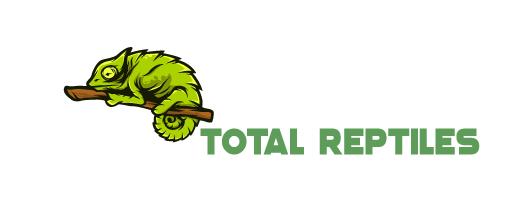Dead or alive, the line in-between is comparatively distinctive in relation to the insect feeders for dragons. So, can bearded dragon eat dead crickets?
It is a matter of offering what is right and nourishing for them. Dead crickets may not be as healthy as live ones because, in a dead state, crickets lose all their moisture from the skin through evaporation that contains the nutrients valuable for bearded dragons.
Additionally, reptiles prefer their insect matter to be alive and gut-loaded to keep their predatory instincts interactive.
Let us give you a detailed tour of the topic that has been assessed and polished rigorously based on experts’ knowledge.
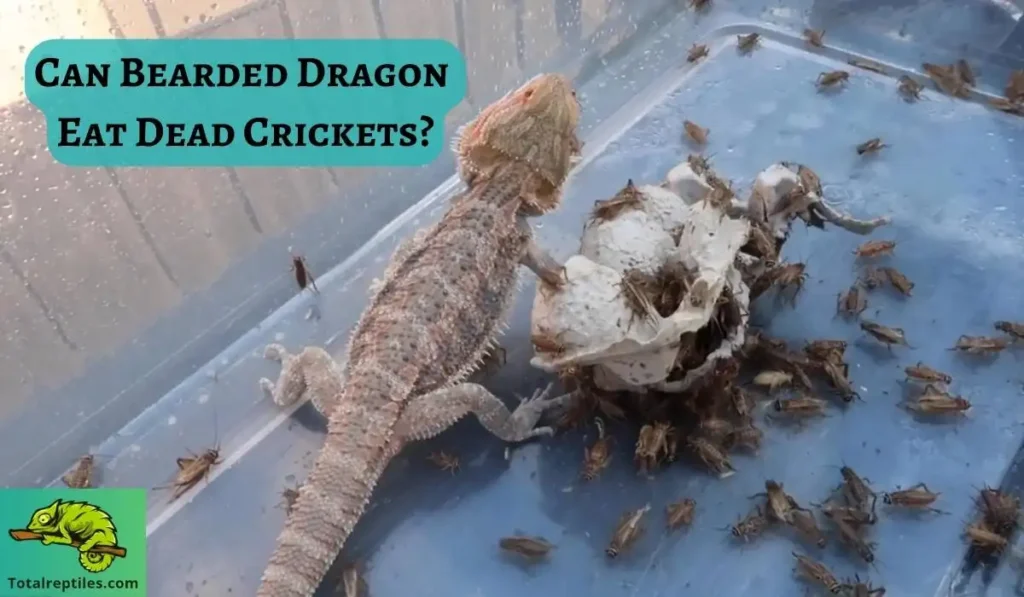
Can Bearded Dragons Eat Dead Crickets?
Yes, they certainly can, but the dead crickets do not serve as a primary diet for bearded dragons. Remember that live insects stimulate hunting instincts and offer mental stimulation for the beardies.
Although crickets are insects, feeding them dead to your pet reptile may prevent it from staying active. Dragons love to chase and catch their prey before consuming them.
If you deprive it of its fun exercise, it may become obese eventually. Besides, dead crickets are not as nutritious, either. The body begins to lose its moisture-retaining ability, evaporating the water content and other nutrients.
Are Dead Crickets Safe for Bearded Dragons?
If the cricket was killed right before the meal, it might still have some of the nutrients for the beardie to absorb. This method is advocated for emergency feeding only.
However, always clean the enclosure of any dead cricket remains, as decomposed elements can severely ill your pet. Do not offer a dead cricket you find amongst the live ones as well.
Decaying insects harbor the most harmful parasites or bacteria that can negatively affect the dragon’s health. In short, dead crickets are not a safe snack under any circumstances.
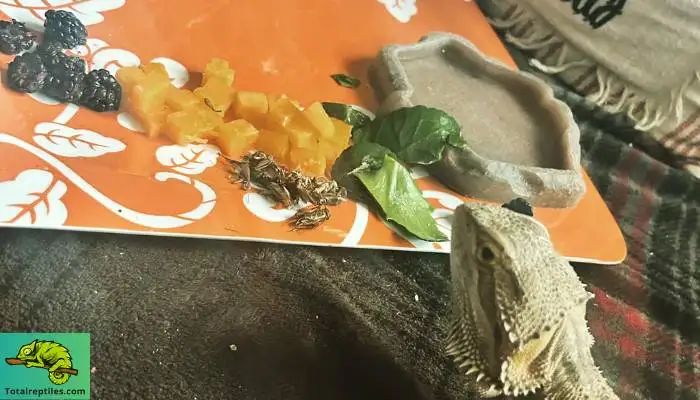
Alternatives to Dead Crickets for Bearded Dragons
Bearded dragons need protein sustenance along with other crucial minerals and elements. Plant matter does not incorporate these as much, so they have to rely on insect matter.
According to studies, an adult dragon requires about 10% insect matter, whereas juveniles and baby dragons need around 70%.
Therefore, providing insects to your pet correlates to its well-being. So, checking for alternatives to dead crickets at reputable reptile stores is better.
Here are some examples to begin with:
- Dubia roaches
- Hornworms
- Live crickets
- Wax worms
- Silkworms
- Super worms
- Butter worms
Furthermore, you can opt for canned insects if it is difficult to procure live ones.
Can Bearded Dragons Eat Black Crickets?
Black crickets are a great choice for reptilian diets. They are highly nutritious and affordable.
Dragons can digest them easily, making them a perfect daily feeder. The best part about black crickets is that they are easier to catch and consume.
Plus, their quiet behaviour keeps the beardie stress-free in its tank. Just make sure you offer the larger ones to adult bearded dragons only.
In general, a bearded dragon can eat as many black crickets as it can during feeding time. This habit should be relaxed, and the owner should not force it.
Also, do not forget that the cricket’s size should be within the distance between the dragon’s eyes.
Can Bearded Dragons Eat Camel Crickets?
Camel crickets are another excellent food source you can choose from. Commonly known as spider crickets or cave crickets, they are quite harmless.
Nevertheless, they can become invasive in a way that damages particular plants or belongings. Due to this nature, we advise serving them only occasionally to your pet.
Their natural defence mechanism is to leap at their predator to startle it. This may stress the dragon in return.
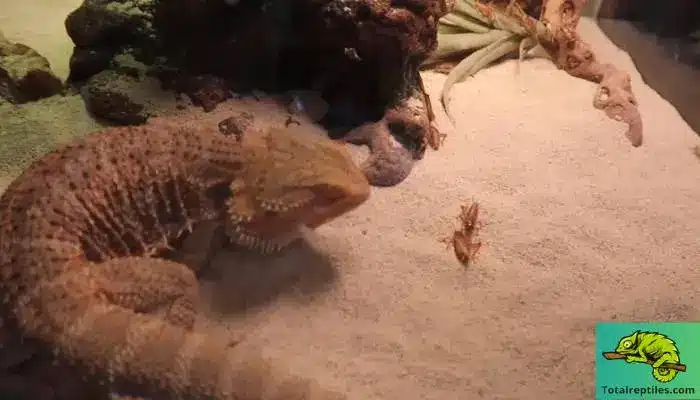
Another reason why these crickets should be a snack instead of a staple food item is their hard exoskeleton. It can hamper the beardie’s digestive system.
Can Bearded Dragons Eat Wild Crickets
Most bearded dragon owners breed crickets to provide fresh staple meals regularly. Those who do not raise them acquire store-bought crickets.
The key is to provide harmless insect matter for your dragon.
So, can bearded dragons eat crickets from outside? As enticing as they may seem, wild insects or crickets are not considered safe snacks. Your reptilian pal may face serious health risks once gobbling these.
Wild crickets or crickets from outside can be different from domesticated ones. They may have dissimilar digestive enzymes and nutritional contents.
Most importantly, they may carry parasites, bacteria, or pesticide residues.
Do Bearded Dragons Have to Eat Live Crickets?
If crickets are the only available insect matter found in your region, then yes.
Whatever insect feeder choice you make, it must be alive and gut-loaded. It enables the dragon to absorb most of the nutrients retained by the insects.
However, that does not mean you should trap crickets from outside to feed them. As stated earlier, they are not recommended for healthy meals.
Here are some benefits of feeding live crickets to your pet:
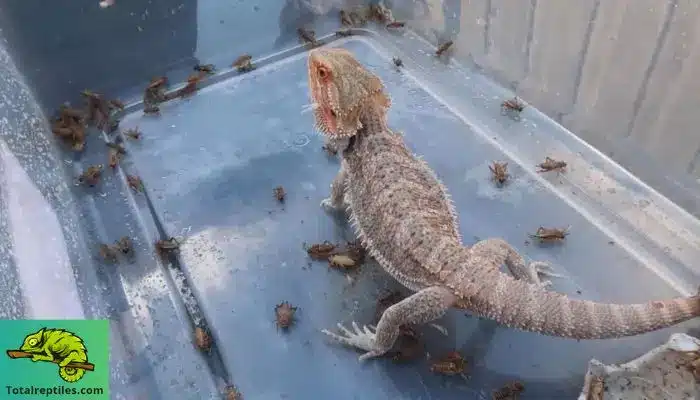
- They are packed with protein, moisture, fiber, etc., to keep reptiles healthy.
- These insects constitute a surprising amount of iron.
- Crickets are an example of a species that prompt excellent feeding responses. Bearded dragons regain their stimulating movements after seeing a live cricket.
- They are easy to gut load with customized nutritive items.
- You can find or raise crickets of various sizes to feed dragons of different life stages.
- Crickets have a softer texture than other insect feeders.
Can Bearded Dragons Eat Freeze Dried Crickets?
Yes, because it is completely different from offering a dead cricket with potential decomposing factors. You can opt for frozen or canned bugs, too.
These insects are pre-killed for the convenience of feeding the pets.
If you are squeamish about handling the live ones, freeze-dried options can feed your dragon all the same. However, observe whether your reptile comes to prefer them over live crickets.
You should know that freeze-dried crickets do not contain the required moisture content that a live cricket retains.
Can Baby Bearded Dragons Eat Crickets?
Baby dragons can eat crickets in greater quantities than mature dragons. From the moment it has hatched up to its 11 months (baby to juvenile), beardies will need higher protein content with low-fat intake multiple times daily.
Crickets provide these along with other nutrients while having a soft exoskeleton. So, crickets are the perfect feeders for your baby dragon.
Younglings will require about 70-80% insect matter in their daily diet to gain body mass and weight. Live and gut-loaded crickets can fulfill these needs without causing any health issues.
Can Crickets Kill a Bearded Dragon?
Although unheard of, crickets can stress a bearded dragon in its tank if the numbers are high. So, place one live cricket at a time for the dragon to chase, capture, and eat.
On the other hand, you need to ensure the crickets are not too large to pass through the beardie’s digestive tract. It can cause blockage buildup and lead to impaction.
If the problem goes unnoticed and untreated, it can become fatal for your dragon. As a rule, the insect’s size should never exceed the width between the eyes of the dragon.
Choking can also occur when the cricket is too big or older. Older crickets usually have a denser exoskeleton, representing a higher chance of choking in a bearded dragon.
Conclusion
Now that you have everything you need, the question looms again. Can bearded dragon eat dead crickets?
Imagine the decomposing or decaying bodies of the insects before considering them a meal for your alive and thriving omnivorous pet.
Dead crickets are not suitable for your dragon for obvious reasons. Avoid giving such foods unless the insect is killed before the feeding schedule.
Go for live alternatives, as they contain more nourishing elements than lifeless ones. And avoid giving wild-caught bugs as well.
References & Resources
- Barboza, T. (et al.), ‘Survey of Feeding Practices and Supplement Use in Pet Inland Bearded Dragons (Pogona vitticeps) of the United States and Canada’, Journal of Herpetological Medicine and Surgery (2022)
- Care, Bearded Dragon. ‘ragon’ (2013)
- Raiti, P., ‘Husbandry, Diseases, and Veterinary Care of the Bearded Dragon (Pogona vitticeps)’ Journal of Herpetological Medicine and Surgery (2012)
